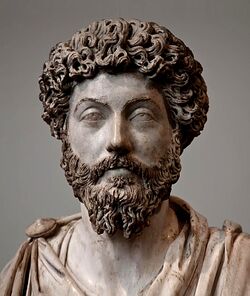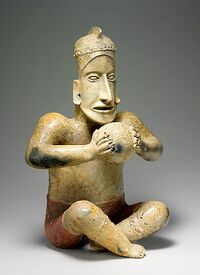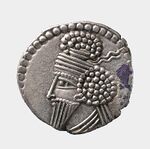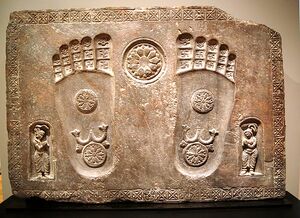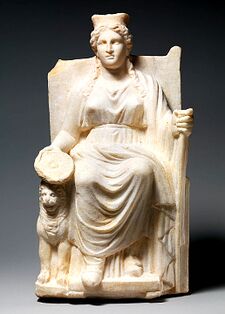2nd century
| ||||||||||||||||||||
This page is a member of the Uncyclopedia Timeline. If an event isn't listed in the timeline, it most likely happened.
Represented here are the time periods from 101 to 200.
The 2nd century is one of great similarities with the previous century, particularly if you're Roman.
The period is one of continued Roman expansion efforts with very mixed results. There is continued pushback from people around the fringes of the empire. The Parthian empire is also trying to expand at this time in the Near East and continues to trade punches with Rome. Both get a clear field to fight each other as the residents of the disputed territories are dead or have moved away. Elsewhere, the "Buy-one-get-one toga" offer proves to be popular with people on the Roman Empire's borders, but the "You'll Love Being a Roman Slave™" advertising campaign proves to be a disappointment for Rome.
Chronology[edit]
101 to 110[edit]
- c.101 – The great city of Teotihuacan is established in central Mexico. Early building codes would prevent the eventual Great Pyramid from being over one story tall, being pyramidal, being made of stone and not having its signature rotating neon sign on the top.
- c.101 – Plutarch is given pen and ink and goes on a writing binge, covering biographies of emperors and other Roman personalities, Spartans, Alexander the Great, plus other subjects. He would become the target of assassination by sheep whose numbers were severely reduced by being turned into parchment.
- 104 – Pliny the Younger is dismayed that his appointment as superintendent of the banks of the Tiber involves a lot of mud and not handling piles of coins.
- 105 – Ts'ai Lun invents paper in China, previously having nothing to put in the bottom of his parakeet's cage[1].
- 107 – Japan sends an ambassador to China. The pieces are sent back within 6 months.
- 108 – After years of debate in the Roman Senate, Emperor Trajan unilaterally declares that "Moose and squirrel must live."
111 to 120[edit]
- c.111 – Gnosticism spreads throughout the Mediterranean area and even to China. They do not recognize the existence of sin, only ignorance, but would later be persecuted by more rigid elements who were really good at it.[2] That group would be led by Montanists, who believe in making up the rules as they went along and killing anybody who disagree with them.
- 113 – The cakewalk is invented by Roman legions reluctant to invade lands unknown to them.
- 114 – The word and concept of "dessert" is invented. Thousands would die after conflating it with "desert" and traveling to the Gobi Desert for an after-dinner treat. Only a few people would die after conflating the word "conflating" with "inflating".
- c.120 – While flying through the air, members of the Nazca culture note vast expanses of empty desert. They then commission various images to be created there, hoping to entertain visiting alien spacecraft.
121 to 130[edit]
- 121 – Polydactylus gives the finger to occupying Roman soldiers, 6 times in fact, but to no avail.
- 122 – Hadrian begins building a wall across northern England in order to keep Scottish weather from spreading south.
- 125 – Suetonius publishes Lives of the Caesars. It's a best seller. He keeps his head by finishing the story with Nero.
- 126 – The Atheneum in Rome is rebuilt by Hadrian. Quite an energetic guy, that Hadrian.
- 127 – Whatever Lola wants, Lola gets.
- 130 – Hadrian's Gate is built in Turkey. Its key was given to a hamster for safekeeping. No one knows why.
131 to 140[edit]
- 132 – A seismograph is invented and built in China. It is destroyed in a flood.
- 132 – Bar Kokhba, infuriated by the Roman practice of putting red sauce on everything, leads a revolt to drive the Romans out of every restaurant in Jerusalem.
- 135 – Epictetus dies after being mistaken for the Greek sculptor Epiktetos for the thousandth time and Epicurus for the millionth time.
- 136 – Jews are blamed for depressing the price of slaves as so many of them are rounded up by Roman armies and sold off.
- 138 – Hadrian acquires the nickname "Ade the Builder".
141 to 150[edit]
- 142 – The Taoist movement Way of the Celestial Masters is established, setting the stage for complicated and mystical backstories in kung fu movies.
- 143 – Emperor Antoninus Pius orders a new wall further north of Hadrian's. This is one made of discarded kilts, soiled underpants and empty Irn-Bru cans. Oh, and dead Picts.
- 144 – Someone left the cake out in the rain.[3]
- 145 – For unknown reasons, migrating whales no longer stop in Paris at a cute little bistro on the left bank of the Seine. Disappointed whalers are forced to buy boats.
- c.150 – Ptolemy writes the Geography, earning the wrath of future generations of schoolchildren.
- c.150 – Ptolemy releases his astronomical treatise, the Almagest. All his calculations are based on an non-moving Earth with stars and planets and Sun circling around but fails to account for the planet being hollow with angry dinosaurs inside. This later 'Geocentric' astronomical view becomes official Catholic Christian doctrine until 1835.
151 to 160[edit]
- 151 – Door-to-door salesmen reach the Caucacus region, driving disgusted Yeti east into the Himalaya Mountains.
- 158 – Doctor Galen, refusing to make house calls, is forced to move to Pergamum to care for gladiators and pieces of gladiators. He also starts turning into a Chimpanzee but the locals are polite and claim not to notice.
161 to 170[edit]
- 161 – Marcus Aurelius becomes Roman emperor. In honor of the event, the Parthian Empire declare war on Rome.
- 165 – The Antonine Plagues begin in the Roman Empire. Marcus Aurelius tries to fob off the blame by calling it Galen's Plague.
- 161 – Lucian of Samosata coins the phrase "doodly-squat".
- 167 – Iguanas conquer Antarctica but would leave, finding penguins hard to chew.
- 170 – Marcus Aurelius's best selling autobiography Meditations wins the Imperial Medal for Best Book. All other writers wisely decline to compete against the emperor.
171 to 180[edit]
- 171 – Frog hair becomes important to the Indian subcontinent for some reason.
- 174 – Galen, being an excellent surgeon, contracts Doctor's Swelled Head Knowitall Syndrome and starts writing about philosophy.
- 175 – The Han Dynasty orders the engraving of Confucius classic works on stone so that everyone could enjoy rubbing them...and each other.
- 177 – Romans slaughter Christians in Lyon, figuring it was about time.
- 179 – The Chinese invent tofurkey. Millions of peasants rise in revolt.[4]
- 180 – Death of emperor Marcus Aurelius on the Rhine frontier. He dies after forgetting to pack his furry boots and goes into the snow wearing his summer sandals. Historian Edmund Burke said this was humanity's last happy year. It's been 2,000 years of shit since.
181 to 190[edit]
- 184 – Yellow Turban Rebellion. Chinese people lose faith in their emperor as their clothes become dingy from washing in silt-filled rivers. Zhang Jue promises them a modern washday miracle and raises a revolt. While the revolt is mostly suppressed by the next year, color-coded rebels would become a big thing in China.
- 189 – A huge cult worshipping Disney Princesses springs up in Anatolia. It would be suppressed by the Romans who prefer their own range of cartoon characters.
- 189 – Liang Province Rebellion. Peasants rise in revolt. A harried Chinese Emperor Xian could only agree that the peasants are revolting.
- 190 – Iraeneus reduces all Christian texts to four books, attempting to stop alternatives to what he considers mainstream (his) religion. Thus, The Velveteen Rabbit and The Flash #111 are two of the works hidden away and secretly kept by those now considered to be heretics.
191 to 200[edit]
- 192 – Roman emperor Commodus, in trouble from the get-go, escapes the dinner from Hell but gets murdered while in the bath with his favorite squeaky toys. His statues are smashed and credit for his works are erased, save for the chamber pot system named after him.
- 193 – Year of the Five Emperors. As the playoff system had not yet been created, Pertinax is the first to be given the ax, killed by his own Praetorian Guard whom he had openly criticized for being too violent and corrupt.[5] The latter auctions off the office of emperor to Didius Julianus.[6] The latter is immediately hated by much of the public with cries of "Hang the DJ/hang the DJ/hang the DJ" and is pushed out by then-general Septimius Severus and then executed[7]. This immediately causes a civil war where another general, Pescennius Niger, also makes a bid to be to be Caesar. Septimius Severus names Clodius Albinus as his own co-Caesar so he could concentrate on general stuff. Despite knowing that Severus had a lot of legions behind him, Albinus tries to take control.[8] Severus beats him down and becomes a traditionalist, bumping off any potential rivals or claimants to the throne.
- 200 – Warlords have taken over power in China, doing warlord things in warlord-y ways.
- 200 – Peru invents Jacket Potatoes. This is the dawning of the Great Spud Wars in South America.
